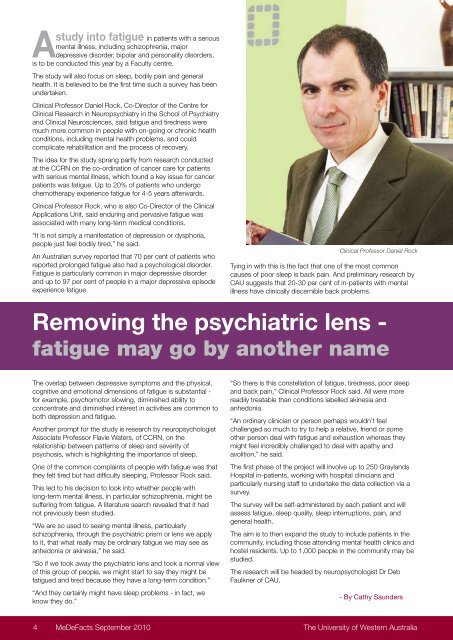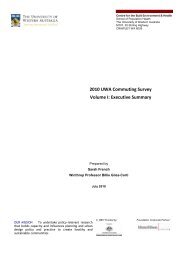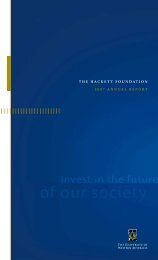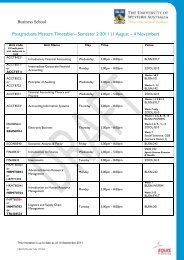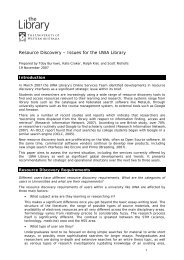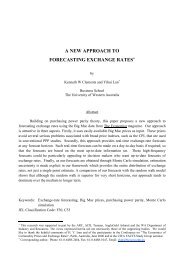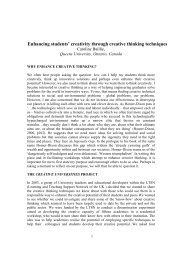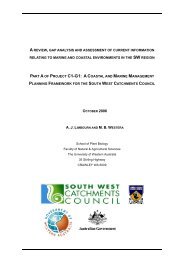MeDeFacts September 2010 - The University of Western Australia
MeDeFacts September 2010 - The University of Western Australia
MeDeFacts September 2010 - The University of Western Australia
Create successful ePaper yourself
Turn your PDF publications into a flip-book with our unique Google optimized e-Paper software.
a<br />
study into fatigue in patients with a serious<br />
mental illness, including schizophrenia, major<br />
depressive disorder, bipolar and personality disorders,<br />
is to be conducted this year by a Faculty centre.<br />
<strong>The</strong> study will also focus on sleep, bodily pain and general<br />
health. It is believed to be the first time such a survey has been<br />
undertaken.<br />
Clinical Pr<strong>of</strong>essor Daniel Rock, Co-Director <strong>of</strong> the Centre for<br />
Clinical Research in Neuropsychiatry in the School <strong>of</strong> Psychiatry<br />
and Clinical Neurosciences, said fatigue and tiredness were<br />
much more common in people with on-going or chronic health<br />
conditions, including mental health problems, and could<br />
complicate rehabilitation and the process <strong>of</strong> recovery.<br />
<strong>The</strong> idea for the study sprang partly from research conducted<br />
at the CCRN on the co-ordination <strong>of</strong> cancer care for patients<br />
with serious mental illness, which found a key issue for cancer<br />
patients was fatigue. Up to 20% <strong>of</strong> patients who undergo<br />
chemotherapy experience fatigue for 4-5 years afterwards.<br />
Clinical Pr<strong>of</strong>essor Rock, who is also Co-Director <strong>of</strong> the Clinical<br />
Applications Unit, said enduring and pervasive fatigue was<br />
associated with many long-term medical conditions.<br />
“It is not simply a manifestation <strong>of</strong> depression or dysphoria,<br />
people just feel bodily tired,” he said.<br />
An <strong>Australia</strong>n survey reported that 70 per cent <strong>of</strong> patients who<br />
reported prolonged fatigue also had a psychological disorder.<br />
Fatigue is particularly common in major depressive disorder<br />
and up to 97 per cent <strong>of</strong> people in a major depressive episode<br />
experience fatigue.<br />
Clinical Pr<strong>of</strong>essor Daniel Rock<br />
Removing the psychiatric lens -<br />
fatigue may go by another name<br />
<strong>The</strong> overlap between depressive symptoms and the physical,<br />
cognitive and emotional dimensions <strong>of</strong> fatigue is substantial -<br />
for example, psychomotor slowing, diminished ability to<br />
concentrate and diminished interest in activities are common to<br />
both depression and fatigue.<br />
Another prompt for the study is research by neuropsychologist<br />
Associate Pr<strong>of</strong>essor Flavie Waters, <strong>of</strong> CCRN, on the<br />
relationship between patterns <strong>of</strong> sleep and severity <strong>of</strong><br />
psychosis, which is highlighting the importance <strong>of</strong> sleep.<br />
One <strong>of</strong> the common complaints <strong>of</strong> people with fatigue was that<br />
they felt tired but had difficulty sleeping, Pr<strong>of</strong>essor Rock said.<br />
This led to his decision to look into whether people with<br />
long-term mental illness, in particular schizophrenia, might be<br />
suffering from fatigue. A literature search revealed that it had<br />
not previously been studied.<br />
“We are so used to seeing mental illness, particularly<br />
schizophrenia, through the psychiatric prism or lens we apply<br />
to it, that what really may be ordinary fatigue we may see as<br />
anhedonia or akinesia,” he said.<br />
“So if we took away the psychiatric lens and took a normal view<br />
<strong>of</strong> this group <strong>of</strong> people, we might start to say they might be<br />
fatigued and tired because they have a long-term condition.”<br />
“And they certainly might have sleep problems - in fact, we<br />
know they do.”<br />
4<br />
Tying in with this is the fact that one <strong>of</strong> the most common<br />
causes <strong>of</strong> poor sleep is back pain. And preliminary research by<br />
CAU suggests that 20-30 per cent <strong>of</strong> in-patients with mental<br />
illness have clinically discernible back problems.<br />
“So there is this constellation <strong>of</strong> fatigue, tiredness, poor sleep<br />
and back pain,” Clinical Pr<strong>of</strong>essor Rock said. All were more<br />
readily treatable than conditions labelled akinesia and<br />
anhedonia.<br />
“An ordinary clinician or person perhaps wouldn’t feel<br />
challenged so much to try to help a relative, friend or some<br />
other person deal with fatigue and exhaustion whereas they<br />
might feel incredibly challenged to deal with apathy and<br />
avolition,” he said.<br />
<strong>The</strong> first phase <strong>of</strong> the project will involve up to 250 Graylands<br />
Hospital in-patients, working with hospital clinicians and<br />
particularly nursing staff to undertake the data collection via a<br />
survey.<br />
<strong>The</strong> survey will be self-administered by each patient and will<br />
assess fatigue, sleep quality, sleep interruptions, pain, and<br />
general health.<br />
<strong>The</strong> aim is to then expand the study to include patients in the<br />
community, including those attending mental health clinics and<br />
hostel residents. Up to 1,000 people in the community may be<br />
studied.<br />
<strong>The</strong> research will be headed by neuropsychologist Dr Deb<br />
Faulkner <strong>of</strong> CAU.<br />
- By Cathy Saunders<br />
<strong>MeDeFacts</strong> <strong>September</strong> <strong>2010</strong> <strong>The</strong> <strong>University</strong> <strong>of</strong> <strong>Western</strong> <strong>Australia</strong>


